Analysis of Uncertainties in Radioactivity Measurements
This document discusses the uncertainties in analytical radioactivity measurements of environmental samples. It includes detailed equations and methods for calculating total propagated uncertainties. Useful for quality assurance specialists, data validators, and radiochemical analysts.
Edit, Download, and Sign the Analysis of Uncertainties in Radioactivity Measurements
Form
eSign
Add Annotation
Share Form
How do I fill this out?
To fill out this form, you'll need to follow the steps for calculating the sample activity concentration and its uncertainty. Gather the necessary data, perform the calculations, and input the values accordingly. Detailed instructions will follow.
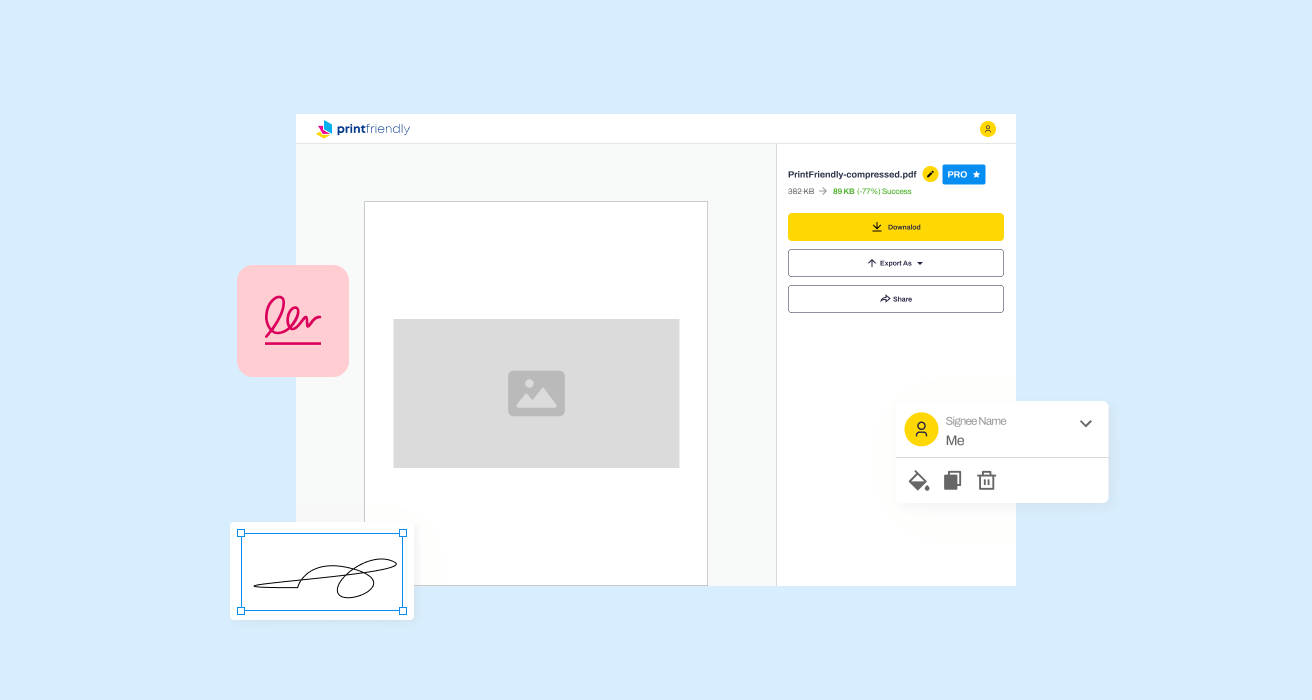
How to fill out the Analysis of Uncertainties in Radioactivity Measurements?
1
Calculate sample activity.
2
Determine sample uncertainty.
3
Calculate blank activity.
4
Determine blank uncertainty.
5
Perform blank correction, normalization, and calculate total propagated uncertainty.
Who needs the Analysis of Uncertainties in Radioactivity Measurements?
1
Environmental scientists need it to ensure accurate measurements of radioactivity.
2
Quality assurance specialists need it to validate the accuracy of radiochemical data.
3
Data validators require it to understand and compute uncertainties in radiochemical analysis.
4
Regulatory authorities need it for compliance with standards and guidelines.
5
Laboratory technicians require it for precise calculations in radiochemical procedures.
How PrintFriendly Works
At PrintFriendly.com, you can edit, sign, share, and download the Analysis of Uncertainties in Radioactivity Measurements along with hundreds of thousands of other documents. Our platform helps you seamlessly edit PDFs and other documents online. You can edit our large library of pre-existing files and upload your own documents. Managing PDFs has never been easier.

Edit your Analysis of Uncertainties in Radioactivity Measurements online.
You can easily edit this PDF on PrintFriendly using our intuitive PDF editor. Add or update information, make annotations, and adjust the layout to suit your needs. Save and download your edited document directly from the platform.

Add your legally-binding signature.
PrintFriendly allows you to sign PDFs effortlessly. Open the document in our editor, add your digital signature, and save the signed file. It's secure, convenient, and legally binding.

Share your form instantly.
Sharing PDFs on PrintFriendly is simple and efficient. Edit or sign your document, then use our sharing options to email, download, or share the PDF via a link. Collaborate seamlessly with colleagues and clients.
How do I edit the Analysis of Uncertainties in Radioactivity Measurements online?
You can easily edit this PDF on PrintFriendly using our intuitive PDF editor. Add or update information, make annotations, and adjust the layout to suit your needs. Save and download your edited document directly from the platform.
1
Open the PDF file in the PrintFriendly editor.
2
Use the text tool to add or update information.
3
Make annotations or highlight important sections.
4
Adjust the layout as needed using the formatting tools.
5
Save and download the edited PDF.

What are the instructions for submitting this form?
To submit this form, gather all required data and perform the necessary calculations using the provided equations. Submit the completed form via email to aberne@eml.doe.gov, fax it to (212) 620-3665, or mail it to Environmental Measurements Laboratory, U.S. Department of Energy, 376 Hudson Street, New York, NY 10014. Make sure all fields are accurately filled to ensure compliance and accuracy.
What are the important dates for this form in 2024 and 2025?
Ensure timely submissions based on your project timeline and regulatory deadlines provided by your organization.

What is the purpose of this form?
The purpose of this form is to guide users through the process of calculating total propagated uncertainties in analytical radioactivity measurements. By providing detailed equations and systematic methods, the form ensures accurate and consistent results for environmental samples. This is essential for compliance with standards, risk assessment, and quality assurance in radiochemical analysis.

Tell me about this form and its components and fields line-by-line.

- 1. Sample Activity: Input the activity level measured in your sample.
- 2. Sample Uncertainty: Calculate and enter the uncertainty associated with the sample activity.
- 3. Blank Activity: Measure and input the activity level for the blank sample.
- 4. Blank Uncertainty: Calculate and enter the uncertainty associated with the blank sample.
- 5. Blank Corrected Sample Activity: Determine the activity after correcting for the blank sample.
- 6. Blank Corrected Sample Uncertainty: Calculate and enter the uncertainty after correcting for the blank sample.
- 7. Sample Activity Concentration: Normalize and calculate the concentration of activity in the sample.
- 8. Total Propagated Uncertainty: Calculate the total propagated uncertainty for the analytical process.
What happens if I fail to submit this form?
Failure to submit this form accurately can lead to significant errors in radiochemical analysis results.
- Compliance Issues: Failing to report accurate uncertainties may lead to non-compliance with regulatory standards.
- Inaccurate Risk Assessment: Errors in uncertainty calculations can result in flawed radiological risk assessments.
- Quality Assurance Problems: Inaccurate data can compromise quality assurance processes and validation.
How do I know when to use this form?

- 1. Environmental Sample Analysis: For accurate measurement of radioactivity in environmental samples.
- 2. Regulatory Compliance: To ensure measurements meet regulatory standards and guidelines.
- 3. Quality Assurance: To validate and verify the accuracy of radiochemical data.
- 4. Risk Assessment: To perform comprehensive radiological risk assessments based on accurate data.
- 5. Laboratory Procedures: For detailed analysis and reporting in laboratory settings.
Frequently Asked Questions
How do I open a PDF for editing on PrintFriendly?
Simply upload the PDF to PrintFriendly, and it will open in our editor for you to make changes.
Can I highlight text in the PDF?
Yes, you can use the annotation tools in our editor to highlight, underline, or strike through text.
How do I save my edited PDF?
After making your edits, click the save button to download the updated PDF to your device.
Can I add a digital signature to the PDF?
Yes, you can add a digital signature using our signature tool in the editor.
Is it possible to merge multiple PDFs on PrintFriendly?
Currently, our platform focuses on editing single PDF files. A merge feature might be available in future updates.
Can I share the edited PDF directly from PrintFriendly?
Yes, you can use our share options to email the document or generate a shareable link.
Are there any limitations on the size of the PDF I can upload?
PrintFriendly supports a wide range of file sizes, though extremely large documents may impact performance.
What types of edits can I make to the PDF?
You can add text, annotations, highlights, signatures, and adjust the layout of the PDF.
How secure is my document on PrintFriendly?
Your documents are handled with care, and our processes ensure security and confidentiality at all times.
Can I download the PDF after editing without any watermarks?
Yes, the downloaded PDFs will not have any watermarks or branding from PrintFriendly.
Related Documents - Uncertainty Analysis in Radioactivity
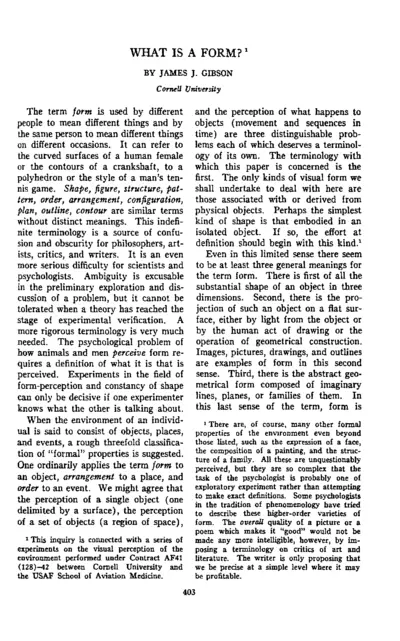
Understanding Form and Form-Perception by James J. Gibson
This document explores various definitions and theories of form, emphasizing the need for precise terminology. It delves into experiments related to the visual perception of form, distinguishing between solid and surface forms. The text critiques traditional views and presents new perspectives on form-perception.
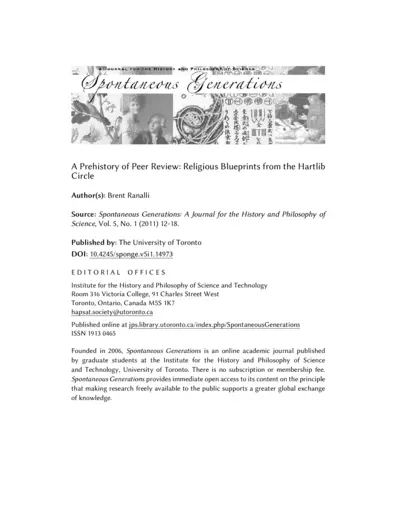
Prehistory of Peer Review: Religious Blueprints
This file explores the origins and development of peer review in science, tracing its roots to religious scholars in the Hartlib circle. It discusses the influence of the Royal Society of London and other early scientific organizations. The content is based on extensive historical research and analysis.
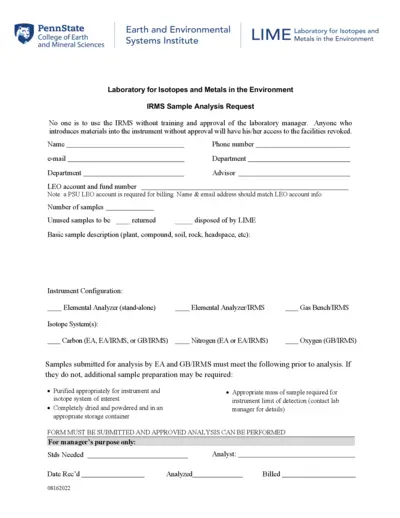
IRMS Sample Analysis Request Form Guidelines
This file contains instructions and details about the IRMS Sample Analysis Request Form. It is used to request sample analysis in the Laboratory for Isotopes and Metals in the Environment. Ensure you have the required approvals before using the IRMS.
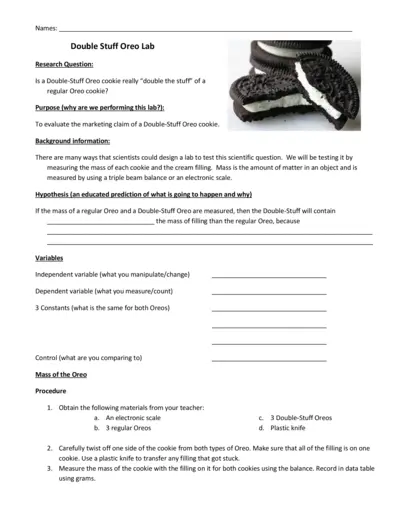
Double Stuff Oreo Cookie Science Experiment
This file contains details and instructions for conducting a science experiment to evaluate the marketing claim of Double-Stuff Oreo cookies. Users will measure the mass of regular and Double-Stuff Oreo cookies along with their fillings. It guides users through the process of data collection, calculation, and analysis using the scientific method.
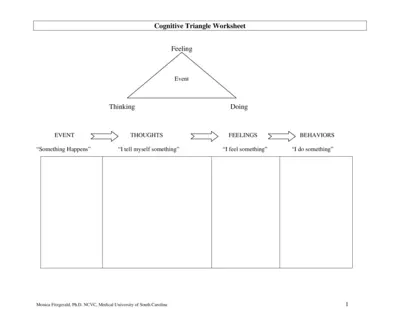
Cognitive Triangle Worksheet Instructions and Details
This file provides an overview and detailed instructions on how to use the Cognitive Triangle Worksheet. It helps users understand the relationship between their thoughts, feelings, and behaviors. Perfect for those interested in cognitive-behavioral strategies.

Engaging Doctor Pretend Play Printables for Kids
Transform playtime with free doctor pretend play printables designed for kids. These fun tools foster creativity and learning through imaginative play. Perfect for children from toddlers to first graders.
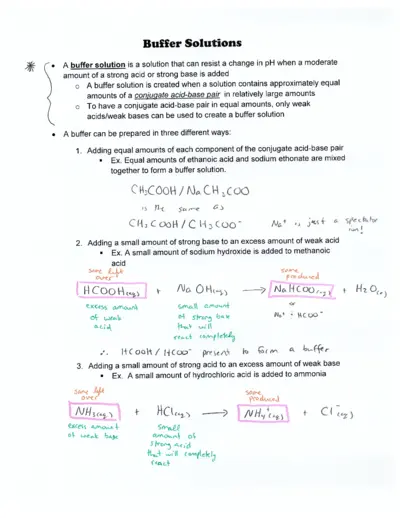
Buffer Solutions: Understanding Their Functionality
This file provides comprehensive insights into buffer solutions, including their preparation and pH resistance mechanisms. Ideal for chemistry students and professionals seeking to understand buffer systems. Practice problems included for hands-on learning.
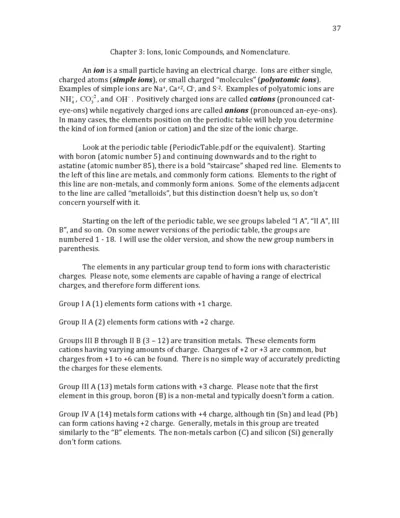
Ions and Ionic Compounds: Understanding Nomenclature
This file provides a comprehensive overview of ions, including their types, charges, and nomenclature rules. It covers essential details such as simple and polyatomic ions, and how to name them correctly. Perfect for students and professionals looking to deepen their understanding of ionic compounds.

Biology Form 3 Notes and Instructions
This file contains detailed biology notes for Form 3 students. It covers essential topics such as organism classification and characteristics of various kingdoms. Perfect for studying and exam preparation.
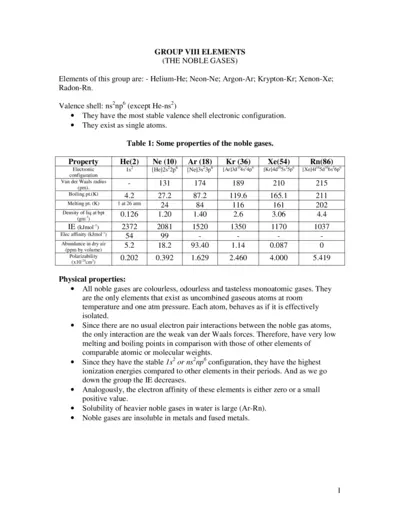
Noble Gases Properties and Chemical Behavior
This document provides a comprehensive overview of the noble gases, their properties, and chemical behaviors. It includes information on individual gases, their electronic configurations, and compound formations. Ideal for students and professionals in chemistry.
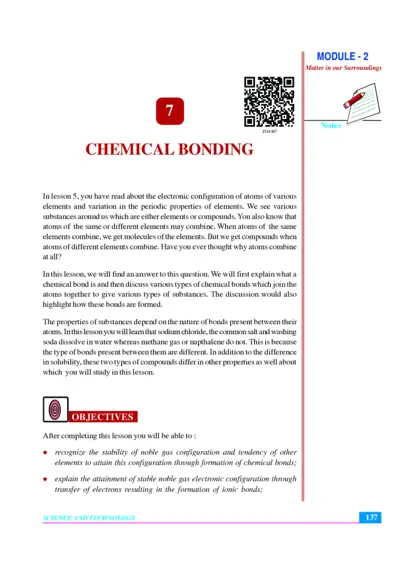
Chemical Bonding and Matter in Our Surroundings
This file provides detailed insights into chemical bonding, including ionic and covalent bonds. It covers the principles of matter in our surroundings and the electronic configurations of elements. Ideal for students and educators in chemistry to enhance their understanding.
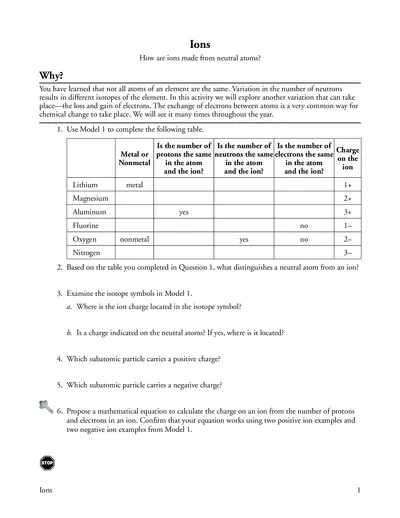
Understanding Ions and Their Formation in Chemistry
This file provides comprehensive insights into the formation of ions from neutral atoms. It covers the characteristics of cations and anions and explores the chemical changes involved. Perfect for students and educators seeking to understand atomic variations.